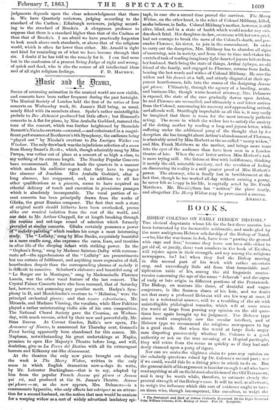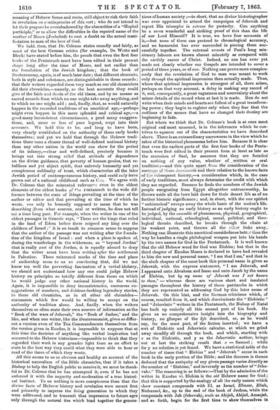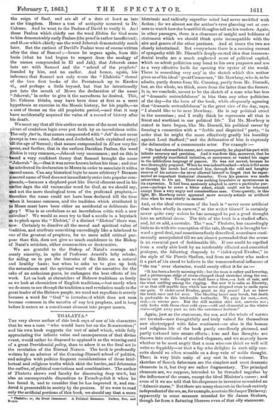BOOKS.
BISHOP COLENSO ON EARLY HEBREW HISTORY.* THE clerical disputants whose life for the last three months has been tormented by the inexorable arithmetic, and made glad by the more ambiguous Hebrew scholarship of the Bishop of Natal, —who, like the war-horse in Job, have been "pawing the ground with rage and fear," because they have not been able either to get rid of, or justify, those vast numbers in the book of Exodus, will rejoice again in their strength, and say among the religious newspapers, ha! ha! when they find the Bishop moving in this second part of his work with rather uncertain step, and exceedingly little aid from that formidable mul- tiplication table of his, among the old linguistic contro- versies concerning the age of the name " Jehovah" and the signs of early or late origin in different portions of the Pentateuch. The Bishop, on matters like these, of doubtful and vague conjecture, is like Samson shorn of his hair, and we doubt not that many a profound Hebraist will see his way at once, if not to a substantial answer, still to a troubling of the air with unintelligible philological remarks, which will at once scare the world at large from passing any opinion ou the old ques- tions here again brought up for judgment. The Hebrew type alone would completely cow the secular intellect, and of Hebrew type we recommend the religious newspapers to lay in a good stock. But when the world at large finds angry men disputing passionately whether Dr. Coleus° is a good authority or not on the true meaning of a Hophal participle, they will retire from the scene as quickly as if they had sud- denly chanced upon a party of tigers.
Nor can we make the slightest claim to pass any opinion on the scholarly questions raised by Dr. Colenso's second part ; nor if we could, would this be a fitting place in which to do so. But the general drift of his argument is familiar enough to all who have read anything at all on the historical criti cism of the Old Testament, and it may be worth while, therefore, to estimate clearly the general strength of the Bishop's case. It will be well, at all events, to weigh the influence which this sort of evidence ought to hard on those who, though incompetent, like ourselves, to weigh the
• The Pentateuch and Book of Joshua Critically Examined By the Bight Reverend John WIUiam Colvin), D.D., Bishop of Natal. Fart. IL Longman.
meaning of Hebrew forms and roots, still object to risk their faith in revelation on contingencies of this sort ; who do not intend to let their prayers be overshadowed by the obscurities of a "Hophal participle," or to allow the difficulties in the reputed name of the mother of Moses (Jocliebed) to cast a doubt on the actual mani- festation to man of the love of God.
We hold, then, that Dr. Colenso states soundly and fairly, as most of the best German critics (for example, De Wette and Bleak) have stated before him, the proofs that even the first four books of the Pentateuch must have been edited in their present shape long after the time of Moses, and not earlier than the foundation of the Jewish kingdom ; that the book of Deuteronomy, again, is of much later date ; that different elements, both in style and substance, are distinguishable in these records ; that their writers regarded them very much as our old chroniclers did their chronicles,—namely, as the best accounts they could give of the faith and deeds of the old times, and by no means as sacred records from which no one might take away anything, and to which no one might add ; and, finally, that, as would naturally happen in the recorded traditions of an uncritical age,—perhaps might even happen in this more splendid and critical age,—a good many inconsistent circumstances, a good many exaggera- tions, and, more or less of pure legend, crept into their accounts. We hold this to be, and long to have been, very clearly established on the authority of these early books themselves ; and yet we hold that through the Hebrew tradi- tions there runs a clearer thread of well-defined national history than any other nation in the world can show for the period of its infancy,—clear and well-defined, precisely because it brings out into strong relief that attitude of dependence on the divine guidance, that poverty of human genius, that re- bellious and yet abject spirit, that unlovely humanity and yet conspicuous sublimity of trust, which characterize all the later Jewish period of contemporaneous history, and could only have grown out of a national childhood such as fais,. We agree with Dr. Colenso that the reiterated referenef's oven in the oldest elements of the oldest books of the rentateuch to the wide dif- ference between the state of things prevailing at the time of the author or editor and that prevailing at the time of which he wrote, can only be honestly supposed to mean that he was describing (from what sources, oral or written, he does not tell us) a time long past. For example, when the writer in one of the oldest passages in Genesis says, " These are the kings that ruled in the land of Edom before there reigned any king over the children of Israel ;" it is an insult to common sense to suppose that the author of the passage was not writing after the founda- tion of the kingdom of Israel : and when a place is spoken of, during the wanderings in the wilderness, as " beyond Jordan" that is really east of the Jordan, it is equally absurd to deny that the writer must have been writing after the settlement in Palestine. These reiterated marks of the time and place of authorship seem to us so convincing that, did we not know too well the perverting fascination of a verbal idolatry, we should not understand bow any one could judge Hebrew history on principles so totally different from those on which he would judge any other national history in the world. Again, it is impossible to deny inconsistencies, enormous ex- aggerations of numbers, and dubious-looking legendary stories, in these old chronicles, as in all other old chronicles— statements which few would be willing to accept on the authority of tradition alone. And, finally, when the writers themselves so often state their own sources of information as the " Book of the wars of Jehovah," the " Book of Jasher," and the like, and when one writer, like the Deuteronomist, gives so differ- ent a version even of the Ten Commandments themselves from the version given in Exodus, it is impossible to suppose that at this time the doctrine of anything like verbal inspiration bad occurred to the Hebrew historians—impossible to think that they regarded their work in any grander light than as an effort to- state in the best way they could what they were able to hear or read of the times of which they wrote.
All this seems to us so obvious and healthy an account of the historical naturalism of the Bible chronicles, that if it takes a Bishop to help the English public to receive it, we must be thank- ful to Dr. Colenso that he has attempted it, even if he has not enforced it with the sagacity and moderation of a true histori- cal instinct. To us nothing is more conspicuous than that the divine facts of Hebrew history and revelation were meant first and primarily to impress the living generation to which they were addressed, and to transmit that impression to future ages only through the natural ties which bind together the genera- tions of human society ;—in short, that no divine historiographer was ever appointed to attend the campaigns of Jehovah and report His triumphs in extenso for posterity. Can anything be a more wonderful and striking proof of this than the life of our Lord Himself? It is true, we have four accounts of it,—but none of them can pretend to chronological accuracy, and no harmonist has ever succeeded in piecing them suc- cessfully together. The external events of Paul's long mis- sionary labours are known almost minutely as compared with the earthly career of Christ. Indeed, no one has ever yet made out clearly whether our Gospels are intended to cover a period of three years, or of one. Nothing can prove more conspicu- ously that the revelation of God to man was meant to work only through the spiritual impression then actually made. Thus, where that spiritual impression is strongest of all, there arises, perhaps on that very account, a delay in making any record of it, and, consequently, a great vagueness and uncertainty about the minor details of the record when at last it is made. Men do not write when their minds and hearts are fullest of a great transform- ing power ; they begin to register only when they fear that the outlines of the scenes that have so changed their destiny are beginning to fade.
But where we think that Dr. Colenso's book is at once most original and most unsound, is in the inferences which he con- trives to squeeze out of the characteristics we have described above. There is an extraordinary narrowness in the view which he takes of the historical phenomena before him. Because it is clear that even the earliest parts of the first four books of the Penta- teuch were first edited in their present form at least as late as the accession of Saul, he assumes that they are founded on nothing of any value, whether of_written or oral tradition ;—and this quite anart ,from the consideration of the contents ca ±bsae &cements and their relation to the known facts of the subsequent history,—a consideration which, in the case of early traditions, must always determine the credit with which they are regarded. Because he finds the numbers of the Jewish people emigrating from Egypt altogether untrustworthy, he throws aside all the laws laid down for their desert life as of no further historic significance ; and, in short, with the one epithet "unhistorical" sweeps away the whole basis of the nation's life. Instead of judging an early history as an early history ought to be judged, by the ensemble of phenomena, physical, geographical, individual, national, ethnological, moral, political, and theo- logical therein described, he breaks through the chain at its weakest point, and throws all the other .links away.- Nothing can illustrate this uncritical onesidedness better than the way he handles a single philological weapon put into his bands by the two names for God in the Pentateuch. It is well known that the old Hebrew word for God was Elohim; but that in the third chapter of Exodus Moses is declared to have had revealed to him the new and personal name, "I am that I am," and that in the sixth chapter of the same book this personal name is given as Jehovah, with the express statement, " I am Jehovah, and I appeared unto Abraham and Isaac and unto Jacob by the name of Elohim, but by my name of Jehovah was I not known to them," — whereas there are various short and insulated passages throughout the history of these patriarchs in which they are represented as addressing God by this later name of Jehovah. On this hint, and the German criticisms which, of course, resulted from it, and which discriminate the "Elohistic " and " Jehovistic " writers in the Pentateuch, the Bishop of Natal has built up entirely all this second part of his book. He gives us no comprehensive insight into the biography and history, no glimpse of the life described, or, as he would say, for the most part, of the fiction inserted; we have a sort of Elohistic and Jehovistic calculus, at which we grind away steadily all through the book, and which, starting with x as the Elohistic, and y as the Jehovistic author, brings out at last the striking result that x = Samuel ; while for y no solution is yet found. We have a statistical table of the number of times that " Elohim" and " Jehovah " occur in each book in the early portion of the Bible ; and the theorem is thence deduced that the antiquity of any given passage varies directly as the number of Elohims," and inversely as the number of " Jeho- vahs." The reasoning is as follows :—That by the admission of the writer in Exodus vi. Elohim is the old Hebrew name for God ; that this is supported by the analogy of all the early names which show constant compounds with El, as Israel, Mazer, Eliab, Nethaneel, &c., up to the end of the book of Joshua, while the compounds with Jah (Jehovah), such as Ahijah, Abijah, Amarjah, and so forth, begin for the first time to show themselves in the reign of Saul, and are all of a date at least as late as the kingdom. Hence a test of antiquity occurred to Dr. Colenso. And he went to the Psalms of David to verify it. And those Psalms which chiefly use the word Elohim for God seem to him demonstrably early Psalms (the proof is rather insufficient), and those which chiefly use the word Jehovah demonstrably much later. But the earliest of David's Psalms were of course written after the time of Samuel ;—hence he argues again, from this basis (what he had begun to suspect from the analogy of the names compounded in El and Jah), that Jehovah came into use with Samuel and the " school of the prophets" founded by him, and no earlier. And hence, again, his inference that Samuel not only wrote the " Elohistic " thread of the two first books of the Pentateuch up to Exodus vi., and perhaps a little beyond, but that he intentionally put into the mouth of Moses the declaration of the name " Jehovah," in order to give it the sacredness he desired. This, Dr. Colenso thinks, may have been done at first as a mere hypothesis or exercise in the Mosaic history, for his pupils,—as a sort of theme on the old prophetic period,—and that it may have accidentally acquired the value of a record of history after his death.
We must say that all this strikes us as one of the most wonderful pieces of credulous logic ever put forth by an incredulous critic. The only fact is, that names compounded with " Jah" do not occur (except in two cases, Joshua and Jochebed, both explained away) till the age of Samuel; that names compounded in El are very fre- quent, and further, that in the earliest Davidian Psalms, the word Elohim is very common,—Jehovah very uncommon ; and on this is based a very confident theory that Samuel brought the name "Jehovah" in,—thist it was never known before his time ; and that he attributed its declaration to Moses in order to associate it with a sacred name. Can any historical logic be more arbitrary ? Because- a sacred name of God does not immediately enter into popular com- pounds,—because a shepherd-poet like David oftenest used in his earlier days the old vernacular word for God, as we should say, and not the more theological term of the professed prophets,— therefore the name could not have been declared till the time when it became common, and the tradition which attributed it to Moses must have been either an accidental or deliberate for- gery ! Who is so credulous as an incredulous critic with a new calculus ? We would as soon try to find a needle in a haystack as to pitch upon the " Elohist," if a distinct " Elohist" there was, now. Certainly to dissolve all the moral and spiritual value of tradition, and attribute something exceedingly like a falsehood to one of the greatest of prophets, for no more solid critical pur- pose than this, does not give us much confidence in the Bishop of Natal's criticism, either constructive or destructive.
We are grateful to the Bishop of Natal's courage and manly sincerity, in spite of Professor Arnold's lofty rebuke, for aiding us to put the histories of the Bible on a natural and healthy basis; but when he asks us to give up both
the naturalness and the spiritual worth of the narrative for the sake of an audacious guess, he endangers the best effects of his work. Let us look at chroniclers of Hebrew traditions as freely as we look at chroniclers of English traditions,—but surely when we do seem to see through the tradition a real revelation made to the great leader of the Hebrew people, we need not repudiate it merely because a word for " God " is introduced which does not soon become common in the mouths of any but prophets, and is long before it enters as a constituent element into proper names.
































 Previous page
Previous page